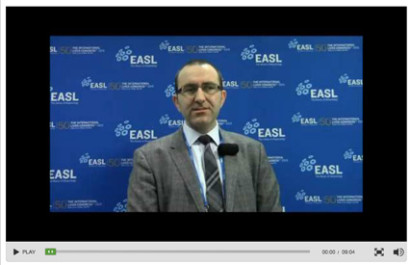News
Video: Dr. Lorenzo Leggio of the NIH discusses alcoholic liver disease

In a video discussing his symposium at the 2015 International Liver Congress in Vienna, Lorenzo Leggio, M.D., Chief of the joint NIAAA-NIDA Section on Clinical Psychoneuroendocrinology and Neuropsychopharmacology, LCTS, presents new thoughts on the treatment of alcohol-use disorder (AUD) and alcoholic liver disease (ALD).
“It’s true that when we have a patient with alcoholic liver disease, we want to treat the liver damage, but, on the other hand, it’s very important to treat the underlying etiology, which is excessive alcohol use,” says Dr. Leggio.
Since liver toxicity is of significant concern for ALD patients, medications currently prescribed for AUD may be contraindicated due to the risk of doing further liver damage. Leggio discusses the importance of developing medications that are safe and effective for treating AUD in those with ALD, including tapping into existing medications that are not approved for AUD but that have shown promise in treating it. He includes such medications as gabapentin and baclofen in this group and notes that when his research group tested baclofen in alcoholic patients with liver cirrhosis, they found it to be safe and effective in reducing drinking and improving liver tests. Leggio stresses not only the importance of continuing to develop new medications for alcoholic patients with AUD, but also the necessity of educating and training physicians so that they are well-equipped to treat patients with both alcohol use disorder and alcoholic liver disease.
“Another very important piece is that while our field is really growing more and more toward the development of new medications, it is equally important that the physicians eventually will prescribe these medications. So, as of today, there is still some misunderstanding sometimes, meaning that some physicians are not even aware that they could prescribe the medications for alcoholic patients,” says Leggio. “It is important to develop new medications but it is equally important to educate the future generation of physicians to make sure that they receive early on, during medical school, during training, the proper education in addiction medicine so that they will know when they will have patients in the office with alcohol dependence and with alcoholic liver disease that they can prescribe medications that will help patients reduce their craving and reduce their drinking.”